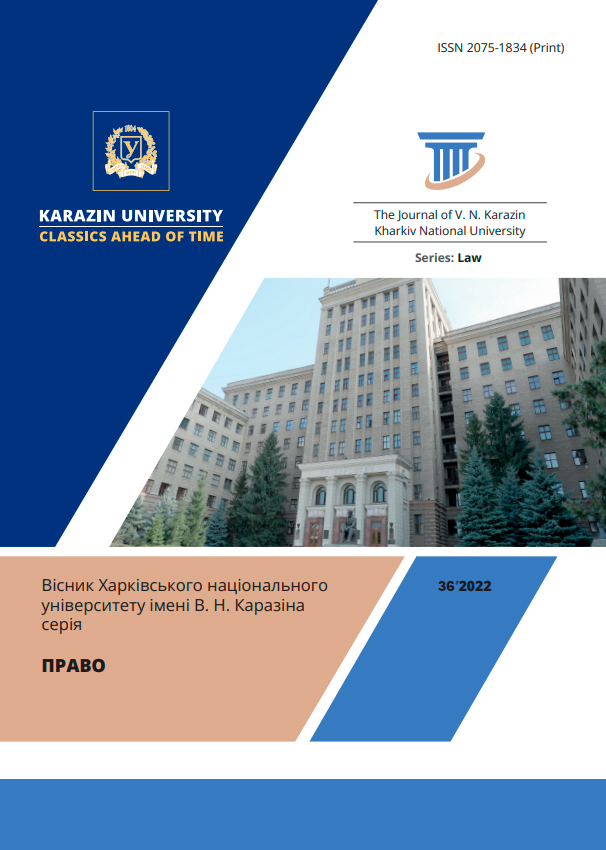Possibilities of using artificial intelligence in criminal proceedings in Ukraine
Abstract
In this article, the author considers the expediency of using of Artificial Intelligence in criminal justice, evaluates the impact of using this technology and describes possible problems that may arise with such application and suggests ways to solve them.
The article examines the topic of possibility of using artificial intelligence in criminal proceedings and its potential impact on increasing the effectiveness of law enforcement and fighting crime.
Starting with an overview of current advances in the field of artificial intelligence, the article analyzes the possibilities of applying artificial inteligence to automate some stages of criminal investigation. Also, the possibility of using artificial intelligence to detect crimes, predict crimes and analyze the behavior of criminals is being considered.
The article examines the ethical and legal aspects of the use of artificial intelligence in criminal proceedings, such as data privacy, protection against injustice and the impact on human rights. Attention is also drawn to the importance of developing algorithms that will be fair and neutral in order to avoid distorting the results of the analysis.
The article highlights the potential benefits and challenges of using artificial intelligence in criminal proceedings and provides recommendations regarding the optimal implementation of such technologies in law enforcement agencies and courts to ensure efficiency, fairness and respect for human rights.
Downloads
References
/References
КАБІНЕТ МІНІСТРІВ УКРАЇНИ, Розпорядження, від 2 грудня 2020 р. № 1556-р Київ, Про схвалення Концепції розвитку штучного інтелекту в Україні, URL: https://zakon.rada.gov.ua/laws/show/1556-2020-р#n8
EUROPEAN COMMISSION FOR THE EFFICIENCY OF JUSTICE (CEPEJ), European Ethical Charter on the Use of Artificial Intelligence in Judicial Systems and their environment, Adopted at the 31st plenary meeting of the CEPEJ (Strasbourg, 3-4 December 2018), URL: https://rm.coe.int/ethical-charter-en-for-publication-4-december-2018/16808f699c
Завальний А. М. Інновації юридичної освіти: осмислення, виклики, перспективи. Науковий вісник Національної академії внутрішніх справ. 2018. № 4 (109). С. 113–132. URL: http://nbuv.gov.ua/UJRN/Nvknuvs_2018_4_11
Радутний О. Е. Юридична освіта та сфера надання правових послуг в контексті штучного інтелекту. Інформація і право. 2019. № 2(29). С. 40–54. URL: http://nbuv.gov.ua/UJRN/Infpr_2019_2_7
Павленко Ж. О. Межі можливого і допустимого в технологічному підході до правового знання. Вісник Національного юридичного університету імені Ярослава Мудрого. 2020. Т. 1. № 44. С. 132–146. (Серія «Філософія, філософія права, політологія, соціологія»). doi: https://doi.org/10.21564/2075-7190.44.195917
Василенко М.Д., Слатвінська В.М., Штучний інтелект в судовій практиці: Особливості та його можливості (міжгалузеве дослідження), Право і Суспільство. 2022. С. 271-278. URL: https://doi.org/10.32842/2078-3736/2022.4.39
Тетяна Анатоліївна Шевчук, Яна Вікторівна Свистун, Використання штучного інтелекту у протидії злочинності, Вісник Кримінологічної Асоціації України. 2021, с 128-134, URL: https://dspace.univd.edu.ua/server/api/core/bitstreams/26d850e6-49ce-4cc6-bf59-a0f14b6b4d40/content
Єдина судова інформаційно-телекомунікаційна система (ЄСІТС) – "Електронний суд", електронне джерело, URL: https://wiki.legalaid.gov.ua/index.php/Єдина_судова_інформаційно-телекомунікаційна_система_(ЄСІТС)_–_"Електронний_суд"
Cabinet of Ministers of Ukraine. Order dated December 2, 2020 No. 1556-р Kyiv, On the approval of the Concept for the Development of Artificial Intelligence in Ukraine. URL: https://zakon.rada.gov.ua/laws/show/1556-2020-р#n8 (in Ukrainian).
European Commission for the Efficiency of Justice (CEPEJ). European Ethical Charter on the Use of Artificial Intelligence in Judicial Systems and their environment. Adopted at the 31st plenary meeting of the CEPEJ (Strasbourg, 3-4 December 2018). URL: https://rm.coe.int/ethical-charter-en-for-publication-4-december-2018/16808f699c
Zavalnyi A. M. Innovations of legal education: understanding, challenges, prospects. Scientific Bulletin of the National Academy of Internal Affairs. 2018. № 4 (109). P. 113–132. URL: http://nbuv.gov.ua/UJRN/Nvknuvs_2018_4_11/ (in Ukrainian).
Radutny O.E. Legal education and the scope of legal services in the context of artificial intelligence. Information and law. 2019. № 2(29). P. 40–54. URL: http://nbuv.gov.ua/UJRN/Infpr_2019_2_7 (in Ukrainian)
Pavlenko Zh. O. Limits of the possible and permissible in the technological approach to legal knowledge. Bulletin of the National University of Law named after Yaroslav the Wise. 2020. Т. 1. № 44. P. 132–146. (Series "Philosophy, philosophy of law, political science, sociology”). doi: https://doi.org/10.21564/2075-7190.44.195917 (in Ukrainian).
Vasylenko M.D., Slatvinska V.M. Artificial intelligence in judicial practice: features and its possibilities (interdisciplinary research). Law and Society. 2022. P. 271-278. URL: https://doi.org/10.32842/2078-3736/2022.4.39/ (in Ukrainian).
Shevchuk T.A., Svistun Ya.V., The use of artificial intelligence in combating crime. Bulletin of the Criminological Association of Ukraine. 2021. P. 128-134. URL: https://dspace.univd.edu.ua/server/api/core/bitstreams/26d850e6-49ce-4cc6-bf59-a0f14b6b4d40/conten/ (in Ukrainian).
Unified judicial information and telecommunication system (UJITS) - "Electronic court". URL: https://wiki.legalaid.gov.ua/index.php/Єдина_судова_інформаційно-телекомунікаційна_система_(ЄСІТС)_–_"Електронний_суд"/ (in Ukrainian).
Copyright (c) 2023 Владислав Блізнюк

This work is licensed under a Creative Commons Attribution 4.0 International License.




